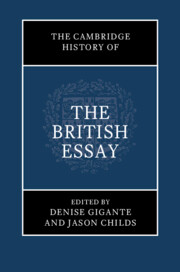Book contents
- The Cambridge History of the British Essay
- The Cambridge History of the British Essay
- Copyright page
- Contents
- Illustrations
- Contributors
- Acknowledgements
- Preface to a History in the Manner of an Essay
- Part I Forming the British Essay
- Part II The Great Age of the British Essay
- 10 Essayistic Personae and Personhood
- 11 Clubs and Coffeehouses: Sociability and the Essay
- 12 Loose Sallies of the Mind: Distraction and the Essay
- 13 The Essay and the Rise of the Novel
- 14 The Periodical Essay and the Rise of Literary Professionalism
- 15 On Books: The Bibliographical Essay
- 16 Satire and the Essay
- 17 Food and the Essay
- 18 Forms of Thought: Dreams, Reverie, and the Essay
- 19 The Urban Familiar Essay of the Romantic Era
- Part III Assaying Culture, Education, Reform
- Part IV Fractured Selves, Fragmented Worlds
- Part V The Essay and the Essayistic Today
- Book part
- Bibliography
- Index
18 - Forms of Thought: Dreams, Reverie, and the Essay
from Part II - The Great Age of the British Essay
Published online by Cambridge University Press: 31 October 2024
- The Cambridge History of the British Essay
- The Cambridge History of the British Essay
- Copyright page
- Contents
- Illustrations
- Contributors
- Acknowledgements
- Preface to a History in the Manner of an Essay
- Part I Forming the British Essay
- Part II The Great Age of the British Essay
- 10 Essayistic Personae and Personhood
- 11 Clubs and Coffeehouses: Sociability and the Essay
- 12 Loose Sallies of the Mind: Distraction and the Essay
- 13 The Essay and the Rise of the Novel
- 14 The Periodical Essay and the Rise of Literary Professionalism
- 15 On Books: The Bibliographical Essay
- 16 Satire and the Essay
- 17 Food and the Essay
- 18 Forms of Thought: Dreams, Reverie, and the Essay
- 19 The Urban Familiar Essay of the Romantic Era
- Part III Assaying Culture, Education, Reform
- Part IV Fractured Selves, Fragmented Worlds
- Part V The Essay and the Essayistic Today
- Book part
- Bibliography
- Index
Summary
This chapter identifies a subgenre of the essay form – the dream-essay – and charts its trajectory from early modern philosophy, through the Romantic interest in vision and reverie. Arguing that that the dream-essay both arises from and extends the sceptical ethos of Cartesian philosophy, it discusses Montaigne’s position on dreams, René Descartes’s vocational dream, and Jean-Jacques Rousseau’s dream reveries. With this background established, it turns to the Romantic dreamers Samuel Taylor Coleridge, Charles Lamb, Leigh Hunt, and Thomas De Quincey, emphasising how, for these writers, dreaming – and writing about dreaming – elaborates a paradoxical form of consciousness which is also a form of expression. The chapter concludes with brief discussions of the contemporary writers Adam Phillips and W.G. Sebald.
Keywords
Information
- Type
- Chapter
- Information
- The Cambridge History of the British Essay , pp. 260 - 274Publisher: Cambridge University PressPrint publication year: 2024
